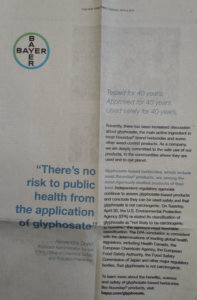Bayer defends glyphosate
This is the second full-page ad like this I’ve seen in the New York Times. This one is from June 4.

As far as I’ve been able to tell, ads like these cost on the order of $85,000 or so.
Bayer, you may recall, bought Monsanto some months ago along with all its baggage (some of which is increasing doubts about the safety of glyphosate for human health).
The ad quotes the EPA as saying that glyphosate is “not likely to be carcinogenic to humans, the agency’s most favorable classification.”
Perhaps, but other agencies—and the courts—come to quite different conclusions. As the Financial Times explains, Bayer’s
weedkiller woes offer two cautionary tales. The first is the high reputational and financial cost of trying to distort the scientific record. Monsanto’s perceived attempts to game the literature prompted the jury to award punitive damages. Questionable practices allegedly included “ghostwriting” papers: persuading outside academics to put their names to internally written, more flattering research, then publishing in scientific journals.
The second cautionary tale has to do with glyphosate’s induction of weed resistance.
Bayer stocks are not doing well. Its stockholders are complaining.
Bayer faces more than 13,000 lawsuits over cancers claimed to be caused by glyphosate.
Hence: these ads.

